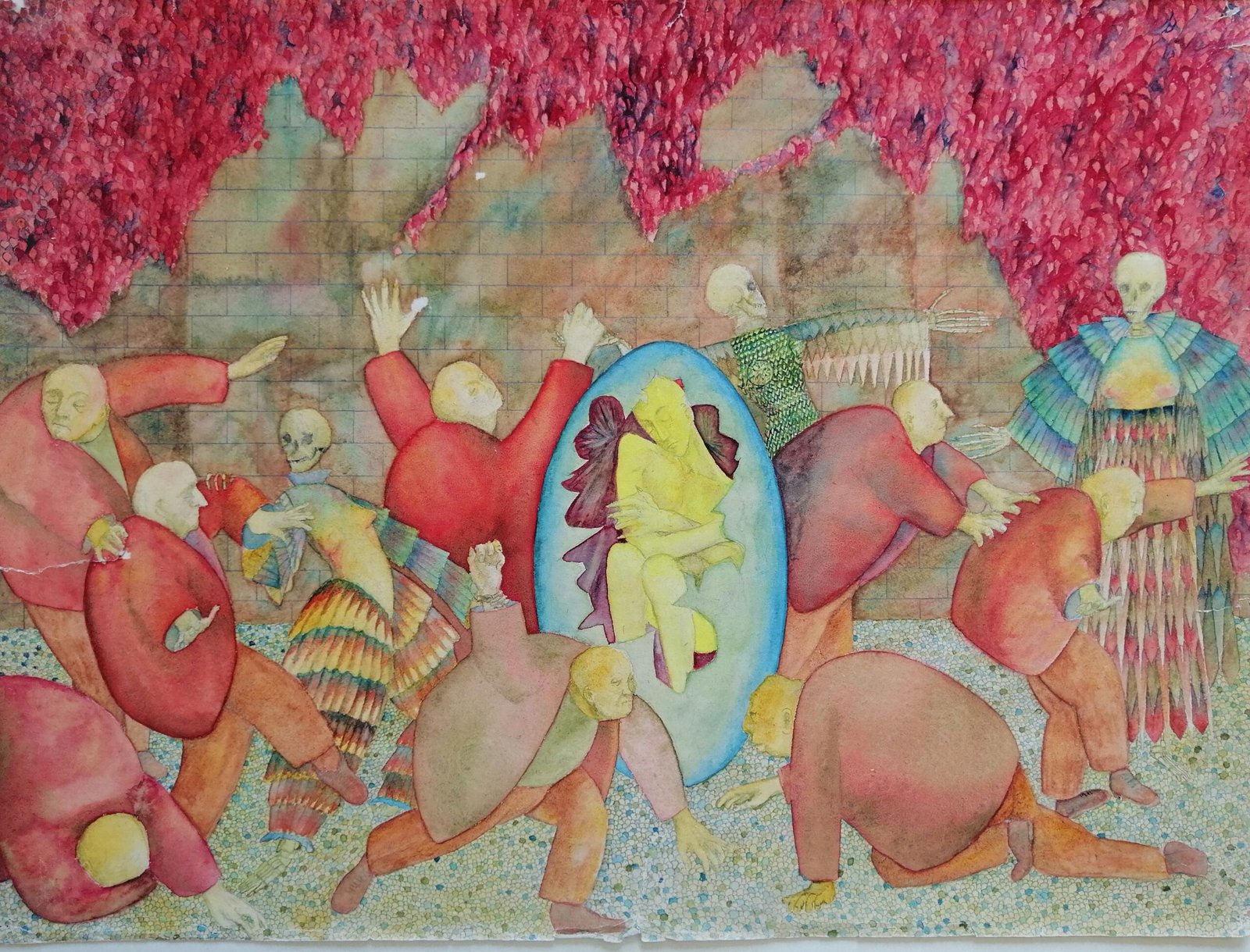A Fragment – Part 2
As music played a big part in Tom’s life I thought this painting made a long time ago might be suitable at this point in the story.
Barish arrived at Haifa by boat. The Golden Dome of the Bahai rises over the city. The day after her arrival Barish stood before its gate. The gate-keeper beckoned with an engaging smile. The Bahai welcomed all beliefs, Islamic, Jewish, Christian and all the others. Such a blossoming withered in a cold wind in the land of its origin and cast it on a different shore. The gold dome and the rose gardens said yes and Tom would have to wait. Barish entered and stayed to work in the beautiful gardens. After some time she stepped outside the gates of the Bahai into another world.
A friendly Israeli offered her a car lift south to see more of his amazing country. Somewhere they passed a field with a large white radar disk standing in the middle. ‘That’s where David fought Goliath’ said the driver. Are such old memories in the minds of those who fight other Goliaths today , wondered Barish. Philistine is another form of the word Palestine, she had learned. How the past lives in us and which past, became an intriguing question for Barish.
They drove further south to where the land rises and Hebron, now a large Muslim city sits on a mountain top. In the Old City, they stood before the Cave of the Patriarchs,where the bodies of Abraham, Isaac and Jacob are entombed. The Cave is honoured by Jews, Muslims and Christians alike. Barish wondered what the honoured dead made of the mutual destruction of their off-spring. Myth and modern reality live together in a fancied world. Barish, the anthropologist was taking notes.
When Barish arrived in Jerusalem she yielded to its special allurement and found a lodging. Walking in the garden of Gethsemane overlooking the brook Kedron a rooster crowed. The images of Tom and Jasper came to her mind. Her next move was to cross the sacred river where the dove descended to join an archaeological team on a site in Jordan.
The work was to unearth burial remains in a prehistoric encampment. Dead bones tell us much and also little. Male or female, young or old, perhaps a chief, a violent death or not? But how did they speak or sing? If words could emerge from the shallow pit what would they say? Reaching into their conscious world, thought Barish, would reveal so much of our own.
I had lost touch with Tom for some years. Then a postcard came from India to say he had given away his bagpipes and was now practicing the sitar. He also had an Indian housemaid. She was harijan, outcast, and had been working on a building site in Delhi which his hotel window overlooked. He had watched her climbing a ladder with a load of bricks on her head for the workmen building the wall of the third storey.
Like a Greek priestess on the Acropolis holding up the porch above! He made inquiries with his barber and as a result met her family. Surprisingly her name was Barish like the friend he once supplied with logs in the Midlands. He asked the family to allow Barish to become his house maid, to cook and clean for him and live with him when he travelled. The family saw that Tom was honest and accepted his generous offer. I wrote to Tom that his life story was a series of surprises.
Nothing he did seemed a consequence of some other event or experience. Mostly we live a life of consequences. One visits a place because someone has mentioned it. In the same way one reads a book, listens to some music, eats certain food, makes certain friends, etc. We all live our consequences, Tom seemed to live non-sequences. I told him he was a master of the non-sequential.
It is not easy to describe Tom’s secret. The things he did seemed afterwards inevitable and not the result of this or that. ‘We need both’, he wrote, ‘the consequencial and the non-sequencial, as you put it.’ I passed on this news to Barish who was then in Israel.
The longing to speak with Tom was now paramount for Barish. Crossing a thousand miles of mosques and muezzins she arrived in India. In Delhi she looked for Tom’s address and found the people who had known him. On the way, walking along the pavement, Barish met a young man paralysed lying on a wooden trolley which he propelled with his hands. Spontaneously she bent down. Their gazes met and they both smiled. She recalled his handsome face and unhindered presence.
The parents of Tom’s companion told her ‘He went off with our young woman some months ago. They said they were leaving and going east.’ ‘The young woman’ surprised and disquieted Barish. She recorded in her diary that she had dreamed of a cockerel crowing on a hilltop.


